A recent landmark inquiry, led by Aboriginal representatives, has established that genocide was committed against Australia’s Indigenous population, particularly in Victoria. This revelation comes from the Yoorrook Justice Commission, which was tasked to investigate the extensive impact of colonization on Aboriginal communities in the state. The Commission’s findings highlight the profound violence and suffering inflicted upon Indigenous populations, leading to a staggering decline in their numbers.
Pursuant to the Commission’s report, it was revealed that the Indigenous population in Victoria plummeted from approximately 60,000 to just 15,000 by the year 1851. This tragic decline was attributed to a combination of mass killings, diseases brought by settlers, and other institutional abuses such as sexual violence and cultural genocide. The Commission outlined that following the colonial invasion in the early 1830s, in less than two decades, three-quarters of the local Indigenous population had vanished due to the relentless violence that plagued their communities.
In addition to declaring the events as genocide, the Commission’s report put forth 100 recommendations designed to address the extensive harm caused by the documented “invasion and occupation.” This includes a necessary call for reparations and a comprehensive overhaul of the education system to better incorporate Indigenous perspectives, ensuring that Aboriginal people have a hand in shaping the content that educates future generations about their history and culture.
The Yoorrook Justice Commission, established in 2021, set a precedent as Australia’s first formal “truth-telling” inquiry. The initiative arose out of an increasing acknowledgment of “systemic injustices” faced by Indigenous peoples across Australia, leading to a national movement towards reconciliation between Indigenous Australians and their settler counterparts. Community leaders stress that the process of reconciliation must include thorough examinations of the nation’s history, the establishment of treaties, and enhanced political representation for First Nations people.
The Commission’s scope was extensive, covering diverse issues such as land and water rights, cultural infringements, incidents of violence, health disparities, and housing shortcomings. Through more than two months of public hearings and the collection of over 1,300 submissions, they gathered vital testimonies directly from Aboriginal and Torres Strait Islander people about their lived experiences.
As the findings of the report emerged, three of the five commissioners—Sue-Anne Hunter, Maggie Walter, and Anthony North—expressed their disapproval of the inclusion of certain “key findings” without providing additional context for their dissent. This division among the commissioners adds an element of complexity to the report’s reception and implementation.
Upon release, the Victorian government, led by Premier Jacinta Allan, indicated a commitment to carefully assess the report’s recommendations. The findings, the Premier stated, expose uncomfortable truths that the state must confront. Jill Gallagher, who heads Victoria’s chief Aboriginal health and wellbeing body, firmly asserted that the findings of genocide are irrefutable. She emphasized the importance of acknowledging these historical truths to foster genuine reconciliation efforts throughout the state.
The report also aligns with a broader national discourse concerning the recognition and rights of Indigenous Australians. Despite attempts to engage in dialogue around these themes, resistance remains prevalent. Recent developments, such as the Australian public’s rejection of a referendum aimed at establishing an Aboriginal and Torres Strait Islander Voice to Parliament, underscore ongoing societal divisions regarding Indigenous rights and representation.
Similar inquiries are either in progress or have been initiated across other Australian states, contributing to the national conversation about the necessity for truth-telling and reparative justice for Indigenous peoples. However, progress remains fraught with political challenges, as exemplified by the suspension of a truth-telling inquiry in Queensland upon a change in government.
In conclusion, the findings of the Yoorrook Justice Commission represent a significant step in acknowledging the injustices faced by Indigenous Australians throughout history. The report not only calls for reparations and systemic changes but also invites all Australians to confront and reconcile with the historical truths that shape their national identity today.











